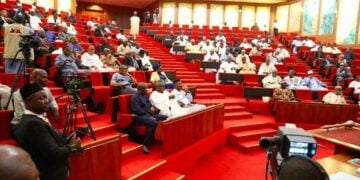South Korean President Yoon Suk Yeol’s new Public Private Partnership (PPP) model leaves doors open for the involvement of the private sector.
Senior Secretary and Special Envoy of the President of South Korea, Jang Sungmin made this known during a recent diplomatic visit to Nigeria, which focused on the expansion of bilateral and economic cooperation between Korea and Nigeria, particularly in sectors driving the fourth industrial revolution.
“Korea government is committed to economic cooperation with Nigeria, as Nigeria is the gateway to Africa. Nigeria has the biggest market in Africa; the largest natural resources and arable land in Africa, all criteria for economic power in Africa. President Yeol believes that by discovering avenues for further economic cooperation will lead to economic prosperity for Nigeria and a faster economic development for Nigeria,” he said.
Noting that in the past, Korea had operated a government to government, and state to state partnerships, with the private sector working on business-to-business basis, Mr Jang said President Yeol’s new model for Public Private Partnership (PPP) will enhance partnerships between Korea and other nations.
“Before, Korea’s public and private sector were on their own, doing their own separate thing. But we are in an era where this is not viable, rather a waste.
“There are issues where the government/public and the private sector need to cooperate, especially when it comes to global challenges that cannot just be achieved by the public sector or by just the private sector alone.
“President Yeol’s new model looks towards a government-to-government partnership as a basic foundation, but leaving the doors open for the very flexible involvement of the private sector. In making government to government agreements, we will allow for a more mutual, complementary model for not only the government and the private sector, but also the countries involved,” he noted.
He said that in the quest to expand economic cooperation with Nigeria, Korea looks towards cooperating in areas of Nigeria’s needs– such as development technology for her energy sector, crude oil refinement and agriculture, where both governments can partner – however, “since the technology is within the Korean private sector, leave doors open for the (Korean) private sector involvement,” said Jang.
He added that as a leading driver of the fourth industrial revolution, Korea has the human resource capacity for technological transfer in the areas of agriculture, cyberspace, security, and bio-technology among others. “Korea looks towards the future with Nigeria,” he added.





